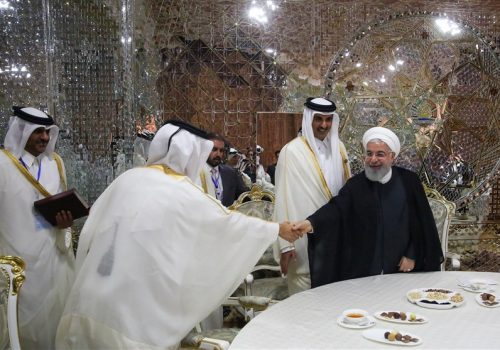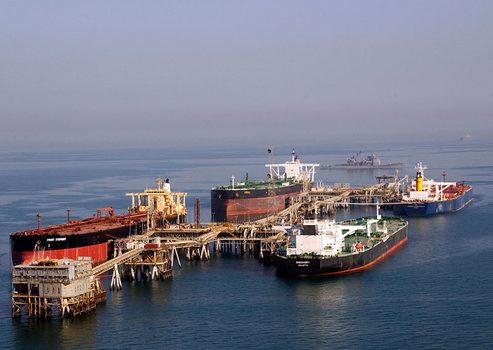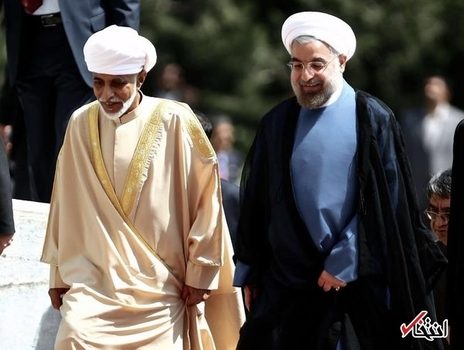Oman’s new sultan and US-Iran tensions
Earlier this month, on January 10, the late Sultan Qaboos bin Said Al Said of Oman passed away. Qaboos’ death marked the end of his nearly five decades on the throne, which made him the Gulf’s longest reigning ruler. The day after the sultan’s passing, his successor—Haitham bin Tariq Al Said—was named. For the Sultanate, moving through the succession process smoothly, decisively, and quickly was important in order to bring an end to years of speculation and fears of internal infighting that would have led to a succession crisis.
Sultan Haitham now has large shoes to fill. Probably no Arab leader has recently had the amount of legitimacy to rule that Qaboos enjoyed among his subjects. Indeed, among Omanis, Qaboos was extremely popular and credited with Muscat’s social and economic development. In the nearly 50 years in which Qaboos was at the helm (1970-2020), he transformed Oman from a backwater country on the Arabian periphery to a modernized and prosperous state with a foreign policy that made the Sultanate a key player in Middle Eastern as well as global diplomacy.
Now that the transfer of power in Muscat went smoothly, many question how or if other states in the Middle East may possibly seek to influence the new Omani leader. While much has been written about the possibility of the United Arab Emirates (UAE) and/or Saudi Arabia using their influence vis-à-vis Oman to pressure Qaboos’ successor into aligning Muscat more closely with Abu Dhabi and Riyadh’s anti-Iranian positions, Tehran obviously has vested interests in preventing such an outcome. Indeed, preservation of the Islamic Republic’s unique and special relationship with Muscat is important for Iran, especially as the Trump administration’s “maximum pressure” campaign continues.
Despite belonging to the Gulf Cooperation Council (GCC), Oman has strong ties with Tehran that Qaboos did much to grow. As Oman and Iran share sovereignty of the Strait of Hormuz, Muscat has been pragmatic about cooperating closely with Iran on a host of regional issues. Moreover, a key pillar of Oman’s foreign policy has been to balance its Arab neighbors and Western allies on one side and Iran on the other. While many officials in some of the other GCC states fear “Iranian expansionism,” the direr set of concerns in Muscat pertain to Saudi Arabia’s quest for hegemony in the greater Arabian Peninsula. Thus, a growing partnership with Iran has enabled Oman to counter-balance the Saudi kingdom, the GCC’s powerhouse, which has not always respected the sovereignty of the Council’s smaller states.
There are also important historical factors in play. Shah Mohammad Reza Pahlavi sending Iranian military forces to Oman to help Sultan Qaboos defeat the Marxist rebellion in Dhofar, which lasted from 1965 to 1976, bought Tehran much goodwill among Omanis. Put simply, the Iranian intervention was a game-changer. Had Iran’s military not entered the fray, it is not clear that Qaboos’ government would have won the conflict. The gratitude of Sultan Qaboos and Omanis—at large—to Iran, outlived the Shah’s time in power and translated into a continuation of good ties with Tehran despite the change of regime in 1979.
Looking ahead, there is no reason to expect Sultan Haitham to make fundamental changes to Oman’s relationship with Iran. The Omani state has gone to pains this month to emphasize continuity, cohesion, and unity in the Sultanate’s internal and external affairs and ways of doing business. As Marral Shamshiri-Fard, a PhD candidate at the London School of Economics and Political Science, explained, “Although Qaboos is gone, his regime survives—and that regime is impossible to understand outside Iran’s support at its time of greatest need.”
In his first remarks since ascending to power this month, the Sultanate’s new head-of-state affirmed that post-Qaboos Oman would continue adhering to the foreign policy principles that Muscat has embraced since 1970. “We will follow the same line as the late sultan, and the principles that he asserted for the foreign policy of our country, of peaceful coexistence among nations and people, and good neighborly behavior of non-interference in the affairs of others.” Like his predecessor, Sultan Haitham is committed to promoting the peaceful coexistence and economic integration of all Gulf states, including Iran.
Since Sultan Haitham ascended to power, the Iranian leadership has taken significant steps to demonstrate Tehran’s commitment to supporting him and preserving the Islamic Republic’s close relationship with Muscat. Two days after Oman’s new leader took the throne, Iranian President Hassan Rouhani sent him a congratulatory message which stressed the “mutual trust” between Muscat and Tehran. Rouhani said, “I hope that the bilateral relations during the era of your leadership would further grow in all fields with wisdom and discernment.” Then, four days later, Iran’s Foreign Minister Mohammad Javad Zarif went to the Sultanate for talks with Muscat’s chief diplomat, Yusuf bin Alawi, in Muscat. Already, bin Alawi has been to Iran twice this year, first on January 17 for the “Tehran Dialogue Forum,” which came four days before his second visit, which was unannounced.
While delivering his inaugural address, Oman’s new leader promised that Muscat would continue to “assist in resolving disputes peacefully.” Without a doubt, Sultan Haitham will be tested early on as he seeks to preserve—and ideally strengthen—Oman’s position as a diplomatic bridge between Washington and Tehran amid a time of US-Iran brinkmanship destabilizing Iraq and other parts of the Middle East.
There is no denying that Sultan Haitham has ascended to the throne at an extremely sensitive time for the Middle East. Oman’s 66-year-old monarch will face many challenges as his country continues balancing its relations with Washington, Tehran, Riyadh, Abu Dhabi, and Doha. To be sure, all GCC states are feeling the heat as the Trump administration and Islamic Republic pursue “maximum pressure” and “maximum resistance.” Iran’s bold actions against the US and its Arab allies during 2019—from the downing of a US drone to the Aramco attacks—and this year—the firing of ballistic missiles at Iraqi bases housing US troops—leave Arab Gulf states nervous about being future targets of Iran’s retaliation.
Although difficult to maintain Oman’s foreign policy based on non-alignment, this approach to international relations is a part of how Omanis see themselves and their purpose in the global arena. Across the Sultanate there is a widespread belief that the Middle East suffers from a lack of dialogue and too many actors in the region rely on excessive military force in their efforts to solve crises. As Omanis see it, it is better to engage the Islamic Republic than to try to isolate it. Officials in Muscat believe that Iran’s behavior will become more moderate if Tehran is accommodated and engaged constructively. In this sense, Oman’s position is that Iran must be brought into—as opposed to excluded from—the Gulf’s security architecture.
With conflicts raging throughout the troubled Middle East and no one knowing where US-Iran tensions are heading, the Sultanate has a special role to continue playing in terms of promoting diplomatic solutions to regional and international crises. That Sultan Haitham vows to maintain Oman’s position as a bridge between Washington and Tehran is positive. There is no doubt that Oman and other countries on good terms with both Washington and Tehran—such as Kuwait, Japan, Qatar, and Switzerland—are going to play key roles in finding avenues for de-escalation.
Oman’s position as an efficient third-party backchannel between the West and Arab states on one side and the Islamic Republic on the other has remained in place for decades. In the region today there are incredibly turbulent waters which will further test Muscat’s ability to strike a delicate balance in its foreign policy of non-alignment. Focused on continuity in Oman’s regional strategies aimed at promoting stability, moderation, and de-escalation of tensions, Sultan Haitham will face major challenges as US-Iran relations remain hostile and GCC states worried about a new war that would inevitably create large-scale crises for Omani interests. Yet these circumstances also provide Oman’s new sultan an opportunity early on in his reign to demonstrate shrewd leadership.
Giorgio Cafiero is the CEO of Gulf State Analytics, a Washington, DC-based geopolitical risk consultancy. Follow him on Twitter: @GiorgioCafiero.
Image: Oman's Minister of State for Foreign Affairs Yousuf bin Alawi shakes hands with Iran's Foreign Minister Mohammad Javad Zarif in Tehran, Iran on July 27, 2019 (Reuters)


